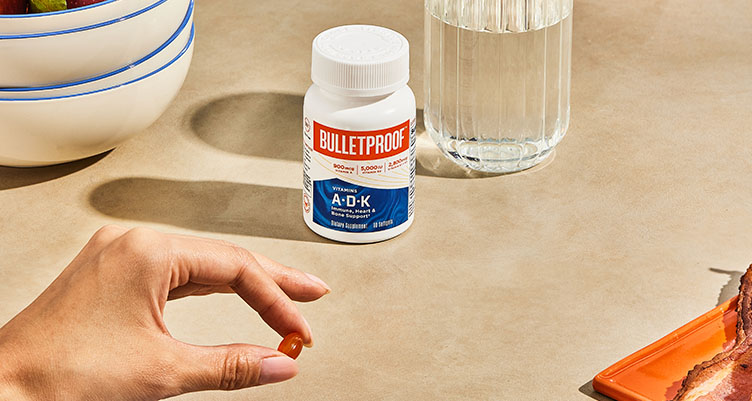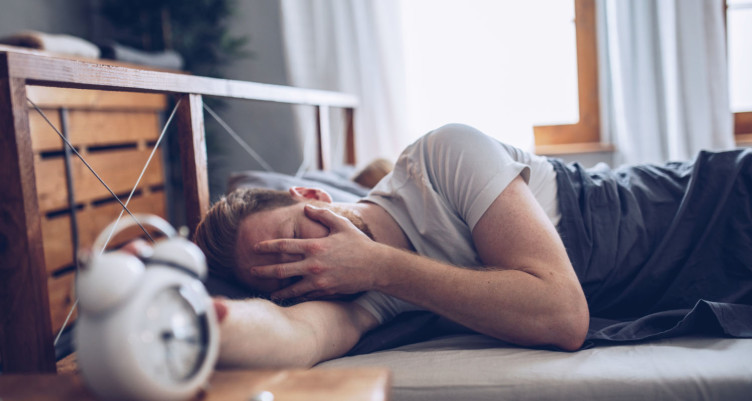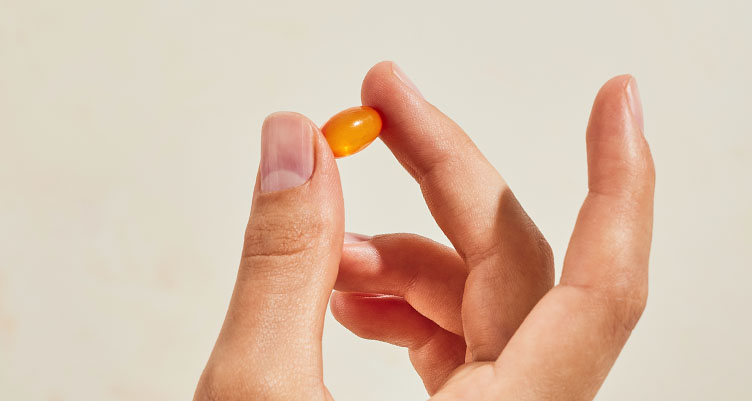The Best Time to Take Vitamin D: Morning or Night?

- The best time to take vitamin D depends on your body and lifestyle. However, vitamin D is a fat-soluble vitamin that’s best absorbed by your body when you take it with a meal.
- Low vitamin D levels can affect your entire body, including sleep. Supplementing can help.
- Keep reading to find out when is the best time to take vitamin D, plus tips to increase your levels naturally.
There are nuances around the best time to take vitamin D and how much to take. Since vitamin D absorption is enhanced with food, many experts recommend incorporating it into your morning routine.[1] This timing may help avoid stomach upset when taken on an empty stomach. However, some individuals may find taking vitamin D in the afternoon or evening more convenient. It’s also essential to balance this with considerations like medication timing to ensure no interactions could affect absorption or efficacy. Determining the optimal time to take vitamin D involves considering several factors to maximize its effectiveness.
A large percentage of the U.S. population is low in vitamin D.[2] That’s a problem because low vitamin D levels, including vitamin D deficiency, can affect everything from your mood to your sleep quality. Unless you have adequate sun exposure, taking vitamin D supplements is an easy way to get enough vitamin D (aka the “sunshine vitamin”) every day.
Here’s what you should consider when deciding when to take vitamin D and how you can naturally increase your daily intake. No matter when you take it, it is essential to ensure you get enough to meet your needs.
Taking Vitamin D in the Morning

Do you take your supplements in the morning? That’s good news if vitamin D is part of your wellness stack. Here are a few reasons why taking vitamin D in the morning could be an excellent way to start your day.
Optimize Absorption by Taking Vitamin D with Breakfast
Since vitamin D is a fat-soluble vitamin—meaning it doesn’t dissolve in water—your body can most easily absorb it when you take it with food.[3] On top of that, many people find that taking vitamins and supplements on an empty stomach can lead to side effects like gastric upset. That’s why taking your vitamin D supplement with your first meal could be best for you.
A Convenient and Consistent Morning Routine
Your morning routine may be the most consistent part of your day. It could be more accessible to remember to take your vitamins and dietary supplements in the morning, either with breakfast or a cup of Bulletproof Coffee. Incorporating it into your morning routine ensures consistent intake, maximizing its potential benefits for sustained daily vitality.
Boost Your Energy and Mood with Morning Vitamin D
Taking vitamin D in the morning can support your energy levels throughout the day by aligning with your body’s natural circadian rhythms.[4] Morning supplementation can boost serotonin production and improve mood and energy.[5] Plus, vitamin D supports overall metabolic function,[6] helping you maintain steady energy levels. All in all, it’s a great way to start the day
How Morning Sunlight Enhances Vitamin D Synthesis
Exposing your skin to sunlight in the morning naturally triggers vitamin D synthesis. Taking a vitamin D supplement in the morning may align with this natural rhythm. Your body produces vitamin D when your skin is exposed to the sun,[7] earning it the nickname “the sunshine vitamin.” Vitamin D supports various functions throughout your body, including immunity, muscle strength, and calcium absorption, which is essential for bone health.[8]
Next, explore the effects of taking vitamin D in the afternoon.
Taking Vitamin D in the Afternoon

If you missed out on taking vitamin D in the morning, don’t worry. There are also benefits to taking vitamin D at lunch.
Flexibility in Vitamin D Supplementation: Considerations for Taking it at Lunch
The best time to take vitamin D supplements is when it fits your schedule. Your morning routine may not be as consistent as you’d like, and you rush out the door without taking your vitamins. Lunchtime is a second chance to supplement with a meal. Remember, it’s better to take your vitamin D supplement a little later in the day rather than not at all.
H3: Enhance Vitamin D Absorption with a Nutrient-Rich Lunch
If you tend to skip breakfast but eat a substantial lunch, it could be better for you to supplement your vitamin D with this meal to enhance absorption. Reach for high-fat foods like avocado, MCT oil, egg yolks, wild-caught fatty fish and grass-fed ghee to improve vitamin D’s absorption.[9]
If you still need to take your vitamin D supplement by the end of the day, you have one chance left: taking it at night. However, there are mixed opinions on whether the benefits outweigh the negative aspects.
Taking Vitamin D at Night

We know that vitamin D and sleep quality are linked, but we’re only beginning to understand how and why that’s the case. Researchers believe that vitamin D may affect our shuteye by interacting with the areas of the brain that regulate sleep.[10] We also know that vitamin D plays a key role in supporting the immune system and overall health, which may support better sleep quality.[11]
Balancing Vitamin D Intake for Restful Sleep
Adequate vitamin D intake helps regulate sleep, but taking it right before bed may disrupt sleep because it interferes with melatonin production.[12] You still want to get enough vitamin D because your levels are directly related to the amount and quality of sleep you get
Researchers have found that low vitamin D levels are linked with poor sleep quality. In one study, participants who increased their vitamin D levels saw significant improvement in sleep and neurologic symptoms.[13]
In another study, researchers examined the vitamin D levels and sleep quality of 3,048 men 68 years and older.[14] They measured total sleep time, wake times and frequency and “sleep efficiency,” which measures the time spent in bed versus the time spent sleeping. The study found that low vitamin D levels were linked to poor sleep and sleeping less than five hours a night. Low levels of vitamin D were also associated with lower sleep efficiency scores.
If you take vitamin D at night as a last resort, consider how it affects your sleep. If you have difficulty falling or staying asleep, consider skipping late-night vitamin D supplementation and waiting until the next morning to take your dose.
Coordinating Vitamin D Supplementation with Medications and Supplements
Another reason you may choose to take vitamin D at night is because you take other medications or supplements in the morning or afternoon. Depending on your health plan, plan your supplementation accordingly to avoid potential issues.
Take Charge of Your Wellness with Vitamin D
Research shows that about 42% of U.S. adults have inadequate levels of vitamin D.[15] There are several reasons you may not get the optimal amount. But if you learn to take vitamin D correctly as part of a well-rounded supplement routine, you can set your body and brain up for success.
H3: Vitamin D Deficiency Symptoms

What happens if you’re deficient in vitamin D? Vitamin D can lead to various symptoms affecting physical and mental health. Common symptoms include bone pain and muscle weakness, which may result in difficulty climbing stairs, getting up from the floor, or standing up after prolonged sitting. You may also experience fatigue, increased susceptibility to infections, and general malaise.[16] Severe deficiency can cause more serious conditions in adults, leading to bone fragility and fractures.[17]
Now, explore some factors that may negatively affect your vitamin D levels.
Not Enough Sunshine
First, you may need more sun exposure. Consistent sun exposure can be hard depending on where you live, your daily schedule and the time of year. Even if you do have excellent sun exposure, factors like sunscreen, time of day and even the clothes you wear can all interfere with your body’s ability to produce vitamin D. Taking a vitamin D supplement naturally means you’ll get enough, no matter the weather.
Diet
Another reason you may need more vitamin D could be your diet. What you eat may need to provide more vitamin D because only some foods naturally contain significant amounts of this nutrient. Vitamin D foods include fatty fish, liver and fortified products. Still, most people do not consume these regularly or in large enough quantities. Plus, vegetarian and vegan diets often lack adequate vitamin D since plant-based sources are minimal. As a result, relying solely on diet makes it challenging to meet the recommended daily vitamin D intake.
Other Factors
Several other factors can block or reduce vitamin D absorption. Gastrointestinal issues, such as Crohn’s disease, celiac disease, and irritable bowel syndrome (IBS), can impair nutrient absorption, including vitamin D.[18] Certain medications, like steroids, weight-loss drugs (orlistat), and cholesterol-lowering agents (cholestyramine), also interfere with Vitamin D absorption.[19] Plus, low dietary fat intake can hinder the absorption of this fat-soluble vitamin, and fat malabsorption disorders can worsen it.
Vitamin D Supplementation Guidelines

Get your baseline levels if you are still trying to figure out where to start. Ask your doctor or healthcare provider for updated blood tests every six months or so—they’ll check your blood levels of vitamin D and other key nutrients, vitamins and minerals your body needs to function. You can also test your blood levels at home using a self-testing service. The recommended daily amount of vitamin D is 600 IU (15 micrograms) for those between the ages of 1 to 70.[20]
If you’re sun-deprived, consider light therapy to increase your daily dose of vitamin D naturally.[21] This type of treatment may also improve your energy, sleep and mood.
The Bottom Line on Vitamin D
Take vitamin D in the morning to prepare your day for success. But even if you take it later in the day, it’s not the end. Try to stay consistent in taking it at the same time every day. Another thing you should aim for is to take vitamin D with a meal that contains fat for optimal absorption.
Sign-up for the Bulletproof mailing list and receive the latest news and updates!
This article has been updated with new content.



